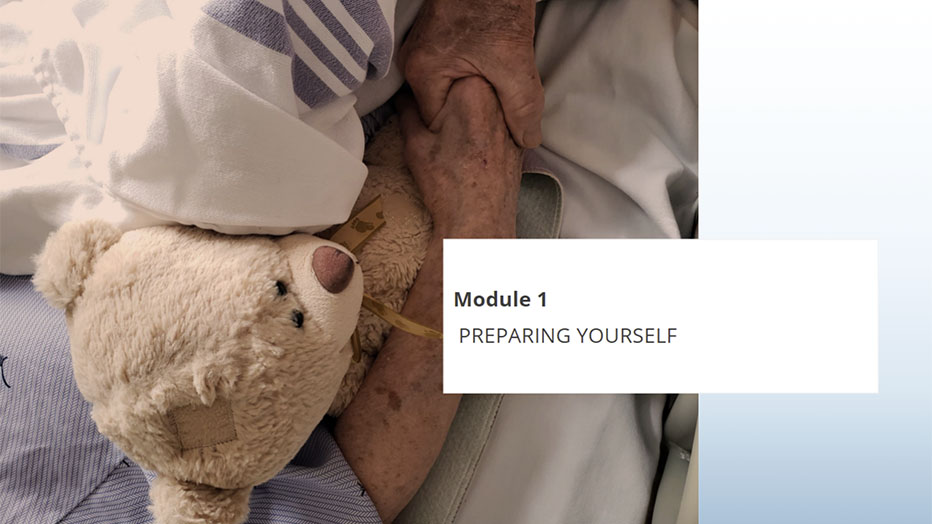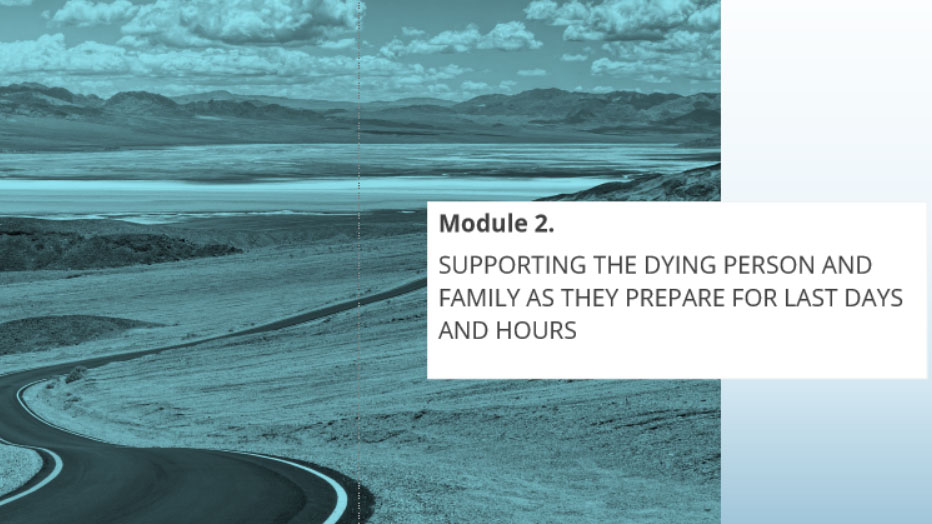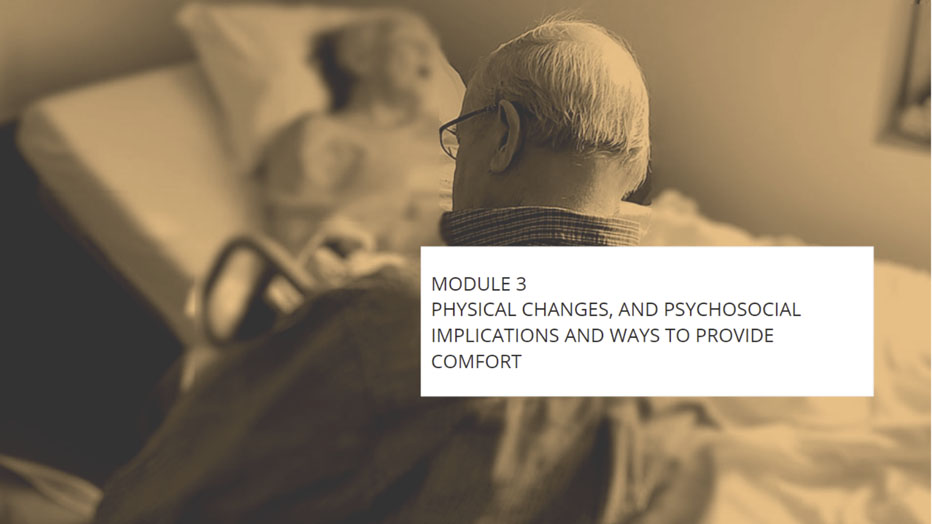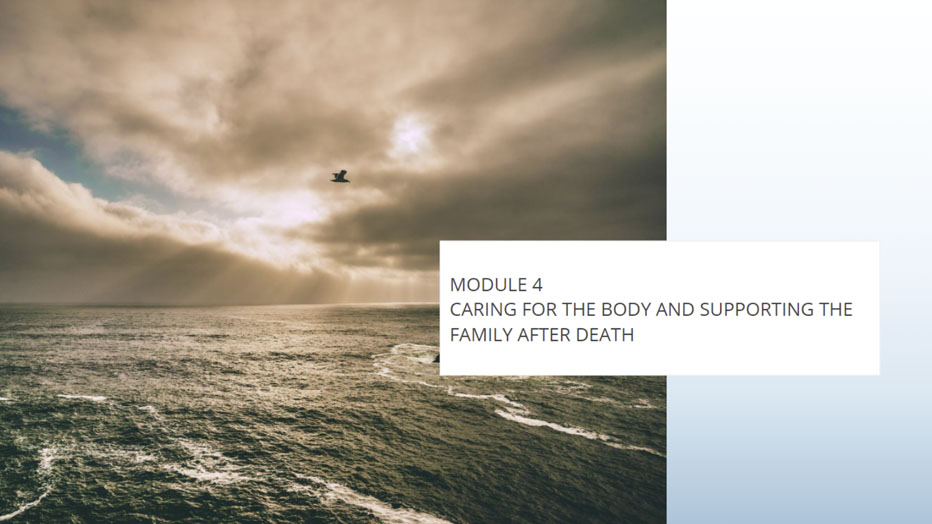10. Last Days and Hours
The last days and hours of a person's life are precious - to the person and their family.
This course will help you as you provide care and support in the last days and hours. Build your understanding of care needs by learning about common physical changes in the last days and hours and ways to support the person's physical comfort. Understand the psychosocial implications of the changes for the family and how to support them. Learn how to care for a body after death, and ways to support a family to be with their deceased loved one, including ways to support rituals and traditions.
Course Overview
The last days and hours of a person's life are precious - to the person and their family. Providing care at this time requires you to prepare, such that you can provide calm, compassionate care that supports the family. Learn how to prepare yourself, and ways to support the family to prepare themselves for the last days and hours. Understand the physical changes in the last days and hours, and the psychosocial implications of each of the changes for family. Learn ways to support the person's physical comfort and to support the family to understand what the changes mean. Learn how to care for a body after death, and ways to support family to be with their deceased loved one. Learn how rituals can help people in their grief, and ways PSWs can support rituals and traditions.
Learning Outcomes
At the end of this course, you will be able to:
- Explain ways that the team can prepare to provide care and support the person and family in last days and hours and following death.
- Explain the importance of advance care planning in identifying rituals, traditions, and practices to follow in the last days and hours, following death, and in caring for the body.
- Describe the central roles of integrating a palliative approach and advance care planning early in the illness trajectory to ensuring appropriate support for a person in their last days and hours.
- Explain the common physical changes that occur in the last days and hours and the psychosocial implications of these changes for the person and the family (including dry sore mouth). Describe ways to support the person and family for each change.
- Describe ways to support and provide care for a person and family at the time of death and following death.
- Explain the PSW’s role in caring for the body following death.
Resources
In this course you will need:
- Access to a printer for course documents
- A writing journal or notebook for writing reflections and course notes.
- Recommended internet browser: Google Chrome

Certificate
Individual course certificates of completion can be downloaded from
the MY COURSES page after passing the quiz with a grade of 70% or
higher.
Quiz Completion
If you cannot submit your completed quiz for grading, it is possible that you may not have opened every slide and allowed the timeline to complete. To correct this issue, return to the modules and check or play every slide to the end of the timeline.
Please login or register for an account to enrol in courses. Use this link
Included:
Module 1: Preparing yourself


Module 1 presents the learning outcomes for the course and then helps you to discover ways to prepare yourself to provide care in the last days and hours of a person's life.
Module 2: Supporting Family to Prepare for Last Days and Hours

In Module 2, you will learn about the challenges that family often experience as their loved one approaches the last days and hours. You'll develop an understanding of the essential role of communication with family and have the opportunity to develop new skills for supporting family.
Module 3: Physical changes, and psychosocial implications

Module 3 describes the common physical changes the people experience as they are dying. You'll learn how to support physical comfort for each of these changes and develop your understanding of the psychosocial implications of these changes for family.
Module 4: Caring for the body and supporting family after death

Learn about the PSW's role in caring for the body, and ways you can support family after death. Understand the role of including rituals and traditions as a person dies, and after death, and ways to encourage family to consider this option.
Module 5: Quiz
Welcome to the final module for this course.
Requirements: 70% or greater to pass the course.
3 opportunities to pass the quiz.
The answer key is shown only after you have passed the quiz.
Check here before starting the quiz
Have you viewed, or clicked on all slides of all modules?
If you have missed any slides, the quiz will NOT be graded.
You will know you have missed slides if you submit the quiz for grading, and you do not get a grade for it within minutes.
How to fix this
- Go back into the modules, select "Menu" in the top left (red circle in image below). This view displays all the slides in the module.
- A viewed slide will have a check mark beside it (Red arrows are pointing at the check marks).
- If a slide does not have a check mark beside it, click the title to set it as viewed. A check mark will appear.
- Repeat this process for all modules of the course.
- When finished, open the quiz module. You will now be able to submit the quiz for grading.